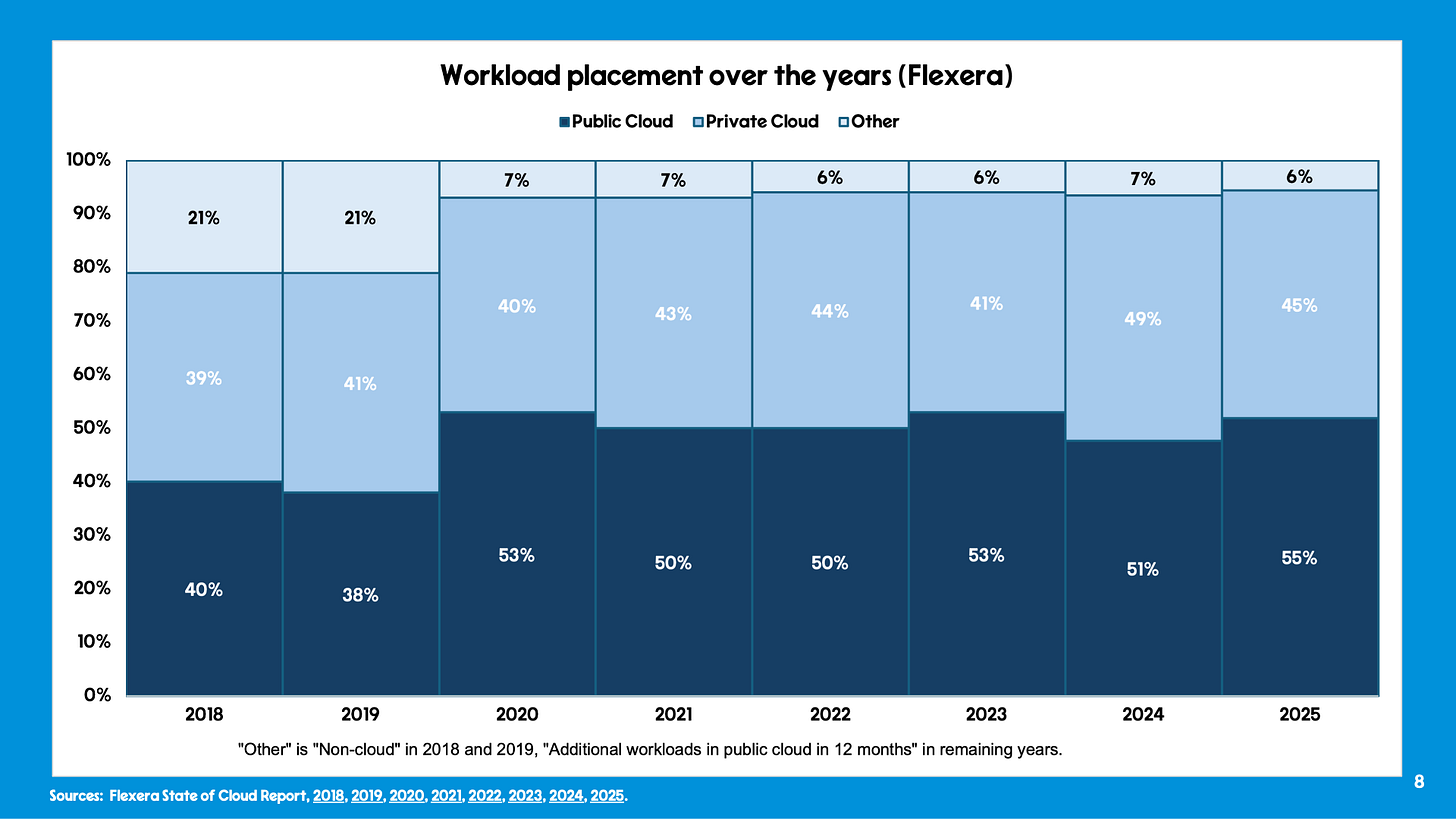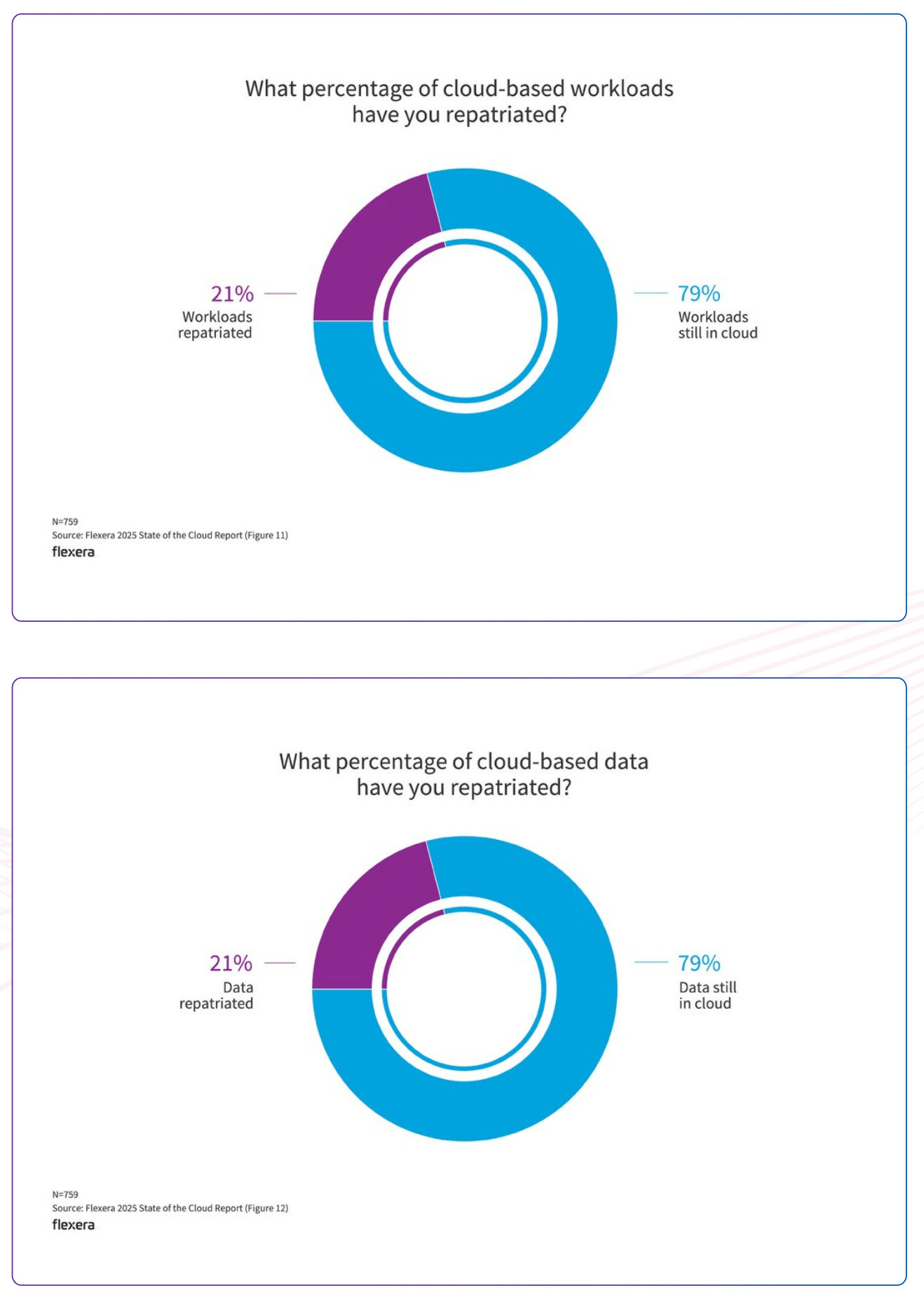The Clouds
You know, I’ve never really looked at the Flexera State of Cloud surveys. I think they’re accepted as legit, and they have many years of data to make those multi-year charts I like. Here’s a quick one my favorite question, “where are the apps?”:
So, following up on my “where’s the apps?” post from last Friday, we’re still in the area of 50/50 and definitely very stable.
The first two years look different than the rest. That’s because for 2018 and 2019, the category was “Non-cloud.”1 Then from 2020 to 2025, the top category is “additional workloads in public cloud in 12 months,” running from 7% to 6% in the past 6 years. That feels like it matches the take-away from the Goldman Sachs CIO survey: people’s plans to migrate to public cloud have stalled out, slowed down, etc.
I looked at this because Matt Asay wrote a good reply-piece to my private cloud checkin from last week:
Yet if the private cloud represents the comfortable, status-quo side of enterprise IT, the public cloud is increasingly the experimental, future-facing side. The equilibrium that Coté notes is real, but it masks an important dynamic: Most of the new, industry-defining innovation is happening on public cloud infrastructure. This has been a trend for a long time.
That is the core thing to pay attention to: make sure whatever stack you have keeps up with innovation.
He also has a great least of reasons/motivations to keep your (enterprise) apps in private cloud:
Data gravity and locality: Moving to or replicating massive data sets in a public cloud can be impractical or costly. Keeping those workloads on premises avoids data transfer headaches and expenses.
Ecosystem integration: Many on-premises apps are tightly integrated with ERP systems, legacy services, and low-latency networks. Keeping interdependent systems together in a private environment can improve performance and reliability.
Governance and control: Private clouds offer perceived security and compliance benefits. (Often that safety is more perception than reality, but here we are). Enterprises with strict data governance or regulatory requirements often feel more comfortable keeping sensitive workloads within their own controlled infrastructure.
Familiarity and cost predictability: Organizations have deep expertise in managing their existing environments. For steady-state workloads, owning hardware offers more predictable costs. Enhancing an existing private setup with developer-friendly platforms can deliver flexibility without the uncertainty of public cloud billing spikes.
As I mentioned yesterday, I think the Europeans would add some detail to Governance and Control: because Trump can turn your shit off on a whim, you know, and also get all your data without you knowing.
I mean, like, that would have been weird to have taken too seriously a year ago, but here we are… But after watching the European Sovereign Cloud Day talks yesterday, I’m pretty sure the Europeans are all about building their own clouds, public and private. I don’t get the feeling they think TACO is risk-managed enough strategy there.2
More charts from the Flexera State of Cloud reports, 2018 to 2025
On repatriation, he pulls this from the Flexera state of cloud, 2025 survey: “only about 21% of cloud workloads have been pulled back, far outweighed by new cloud migration and growth.” That is a lot more than I would have thought. Charts:
And, for my main question, “how many apps are on public cloud versus private cloud,” the Flexera surveys have it around 55% public cloud to 45% private cloud, depending on company size.
Relative to your interests
MCP Best Practices - Including unit tests!
alto.index - Transform Your Apple Apps Data into AI-Ready Markdown - Export stuff from your Apple apps. I use Exporter, it’s pretty good.
UK govt study: Copilot AI saved workers 26 minutes a day - Well, that’s one way to do the ROI dance. // “And even using the more modest projected time savings of 4.59 days per employee per year, the £19 per employee per month cost of a Microsoft Copilot Pro subscription in the UK appears to be worthwhile.”
PwC’s AI Agent Survey - New bullet points (or really big text) for slide 3 of your AI pitch deck. // ”Of the 300 senior executives in our May 2025 survey, 88% say their team or business function plans to increase AI-related budgets in the next 12 months due to agentic AI. Seventy-nine percent say AI agents are already being adopted in their companies. And of those adopting AI agents, two-thirds (66%) say that they’re delivering measurable value through increased productivity.”
Tips on prompting ChatGPT for UK technology secretary Peter Kyle - Good tips on working with AIs: (1) use them a lot to build up an intuition of what works, (2) be aware of what they know, the cut off date for training and assume they have general, accepted mainstream knowledge, nothing too obscure, (3) use them for brainstorming and structuring your work. A crude summary: garbage in, garbage out.
Postfacto - Little utility to do team retros, from the Pivotal Labs folks. Open source, all that.
The robot read it
I don’t get the chance, or desire, to read everything. Sometimes, I have the robot read it. Here’s what it says. While enjoyable to read, robot summaries are not endorsements or necessarily my own opinions.
Fungi were once misclassified as plants, but are now offered as a model for artificial intelligence—quietly nourishing ecosystems while decomposing them from within. Somewhere in an English field, Chloe Dalton rescued a baby hare and rewilded her soul, which was not measured by precision sensors.
National Grid and Thoughtworks gave their legacy systems a second life using Change Data Capture and Domain-Driven Design. Meanwhile, a group of engineers procrastinated because their work was boring, vague, and stressful, a revelation that surprised no one but was backed by data.
The euro was meant to unify Europe, but mostly helps Germany borrow cheaply and issue stern looks to the rest. In Brussels, the European Commission moved to loosen enforcement of the newly minted AI Act, quietly shelving liability rules and allowing providers to self-certify as “low risk,” which has never gone wrong before.
Researchers taught one AI to critique another AI’s thoughts so the second could reflect and improve, completing the circle of academic life. And Pavel Samsonov diagnosed the “everything app” as a symptom of “nothing management”—a corporate condition in which leaders agree to everything until the product does nothing at all.
Conferences
I don’t have much in the books at the moment. A list of CFPs I should really submit to. What conferences do you recommend I try and speak at?
SREDay Cologne, June 12th, speaking (10% off with the code CLG10).
Logoff
I’m checking out Gemini and, thus, NotebookML again. So far, so good. I think. This is about the third time I’ve paid for it to try it out. Here’s my two test criteria this time: (1) does it have some personality? For this, I did a lot of coaching in the Saved Info section - this is where you can give it instructions and background that, I assume, gets loaded with every chat, (2) can I upload a shit-ton of content to it and have it actually use it.
I like this switch for a historical word-usage reason too. Back then, people would get really itchy if you said “private cloud” and included everything on-premises. They’d point out that a lot of what wasn't “cloud” - I don't know, automated, self-service, virtualized and containerized? These were the same people who got upset if you said or typed “on-prem.” Now, I don’t think anyone cares about either of those.
Of course, as I like to joke: if you went to American companies and you were like, “hey, what would you say if I suggested you should run all you of your business and store your data in France, under French and EU jurisdiction,” I highly doubt their answer would be “totes McGoats, love it, call up Wipro and let’s migrate that shit!”




